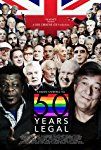Eye For Film >> Movies >> 50 Years Legal (2017) Film Review
50 Years Legal
Reviewed by: Jennie Kermode

On the 27th of July 1967, the Houses of Parliament at Westminster passed the Sexual Offences Act 1967, decriminalising discreet sexual relations between men over the age of 21 in England and Wales. It was a long way from creating equality - such relations would remain illegal in Scotland until 1981 and the age of consent would not be equalised until 2003 - but it was pivotal in that it constituted the first formal acceptance by the state that gay people might be deserving of some sympathy. Over the years since, a great deal more progress has been made, both legally and culturally. Simon Napier-Bell's documentary explores and celebrates this process, using interviews with key players from different generations whose own attitudes reflect the shift in social perspectives.
Though only an hour and a half long, the film is extraordinarily comprehensive, exploring its subject decade by decade and contextualising each major development with personal stories about the changes that resulted from it. Its detailing of the strategies used to win public support and overcome political resistance will prove particularly useful for today's human rights campaigners, and it is given added context by its release in the middle of a moral panic over transgender rights, with clear parallels between the types of language and scaremongering used by opponents in each case.

Although the nature of the 1967 legislation and the persecution that preceded it means this is primarily a film about gay and bisexual men, there was of course much less clarity about the distinction between sexual orientation and gender in that era, with many trans women living as gay men (including interviewee Quentin Crisp, whose acknowledgement that life as a woman would have made more sense postdates recording) and many gay men adopting stereotypical feminine accoutrements and mannerisms as a means of identifying themselves to others. Lesbians are somewhat sidelined and bisexual women barely even mentioned, though Angela Eagle makes a strong contributor. The absence of discussion of butch and femme tropes is perhaps welcome, but tensions within the LGBT community are still visible, with hints of biphobia in places and a tendency by some older gay male contributors to assume that everything is alright now and the battle has been won. A focus on transphobia towards the end of the film amply illustrates that this is not the case, and provides balance without the need for direct contradiction, allowing for a succession of contributions that feel relaxed and very real - itself indicative of an important victory.
The balance of contributors from different generations also hints at the psychological impact of prejudice, with older contributors finding more joy in early improvements but also talking about the need to laugh at oneself in a way reminiscent of kids in the playground who try to deflect the attention of bullies by voluntarily decrying themselves first. Younger contributors are focused on a different set of struggles and have the energy that's easier to find at that stage in life but also clearly evidence the greater confidence they have inherited as a result of the previous generation's battles. There are exceptions, of course. Peter Tatchell stands out for the consistency of what he has to say about each stage of the struggle. Marc Almond, meanwhile, offers a very personal perspective which puts into context the way that social change could drive personal change at a pace sometimes a bit too intense for individuals - the joy of liberation did not universally make coming out less frightening.
Almond's music is celebrated here also, along with the contributions of artists like Dusty Springfield, David Bowie and, of course, Tom Robinson, whose joyous anthem Glad To Be Gay forms the backbone of the film. Napier-Bell situates the film in the context of wider social change, looking, for instance, at the LGBT support for striking miners that would be portrayed on film in Pride. He deals with the impact of the AIDS crisis (the occasion of some particularly painful testimony) and with Margaret Thatcher's exploitation of homophobia and introduction of Clause 28, which latter allows for a reminder that progress never comes with guarantees and hostile measures can be introduced where there were none before. It's an important caution in a film that could too easily have opted for a triumphalist Hollywood ending.
An astute and thorough piece of work, 50 Years Legal is a valuable contribution to LGBT history and to the broader battle against prejudice that is central to how Western society has evolved in recent decades. It's informative enough for scholars yet easily accessible to newcomers to the subject - and that it exists at all is testimony to the struggle it depicts.
Reviewed on: 24 Apr 2018


















